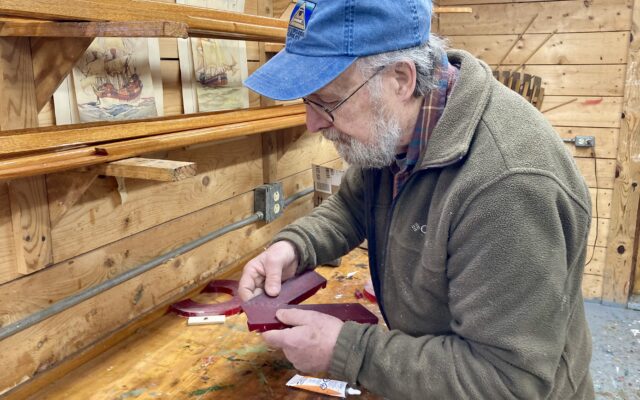
Master canoe builder is helping preserve a historic Maine theater marquee
DOVER-FOXCROFT — Rollin Thurlow restores and handcrafts timeless wooden canoes for a living.
But every six weeks or so, usually on a Saturday or Sunday, Thurlow tucks himself away in the back room of his workshop, where the space dedicated to painting his boats transforms into what he calls a “letter hospital.”
With gentle hands and a specific combination of glues and epoxies, he patches up the iconic red block letters that grace the Center Theatre’s marquee in downtown Dover-Foxcroft.
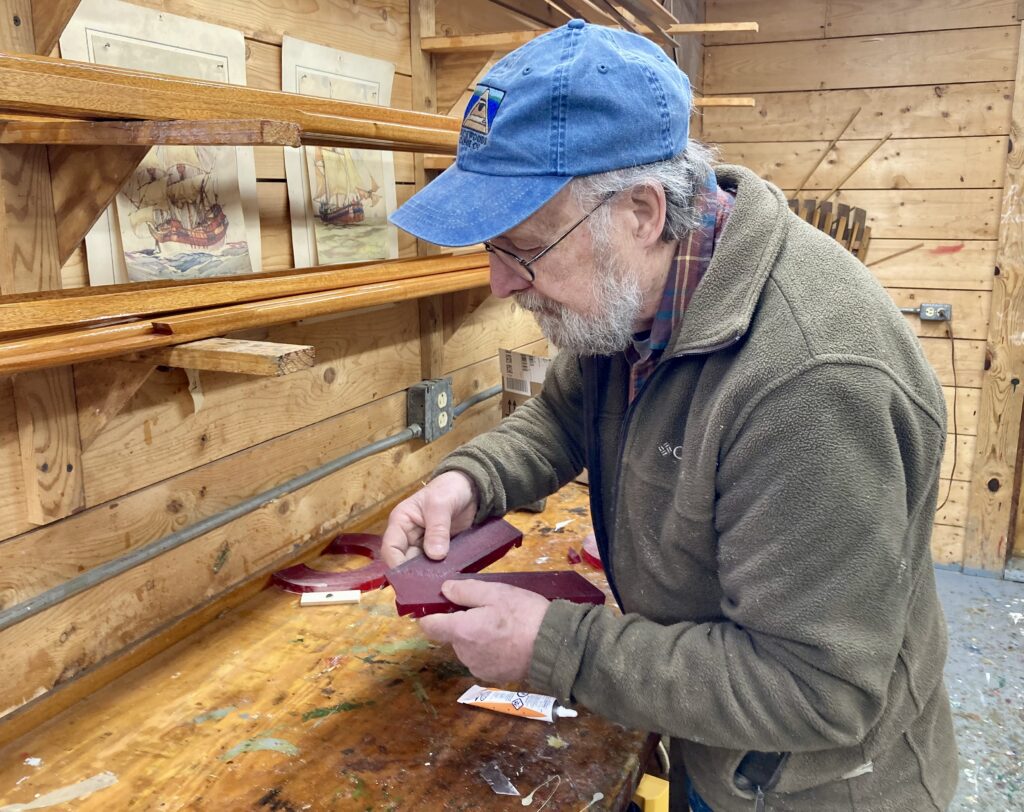
MARQUEE WORK — Rollin Thurlow, pictured at his Atkinson business Thursday, restores and builds canoes for a living. He also volunteers his time and skills to the Center Theatre in Dover-Foxcroft by repairing damaged letters that have fallen from the marquee.
The historic Center Theatre — which was built in 1940, thrived as a cultural hub but eventually closed in the 1970s and was revived in the early 2000s — is both a movie theater and performing arts venue. It’s a landmark in Piscataquis County and hosts the beloved annual Whoopie Pie Festival that draws thousands.
It’s also one of only several old-school, independent theaters remaining in Maine. The work of Thurlow, whose connection to the theater goes back a few decades, means a great deal because the letters are expensive to replace and are becoming more challenging to find, said Patrick Myers, the theater’s executive director.
“The only company that I know of that makes this particular style of marquee letters has gone out of business,” Myers said. “Rollin’s willingness to repair them is very important for us. It grew out of the fact that he was changing the marquee, and it seemed like a waste not to fix them.”
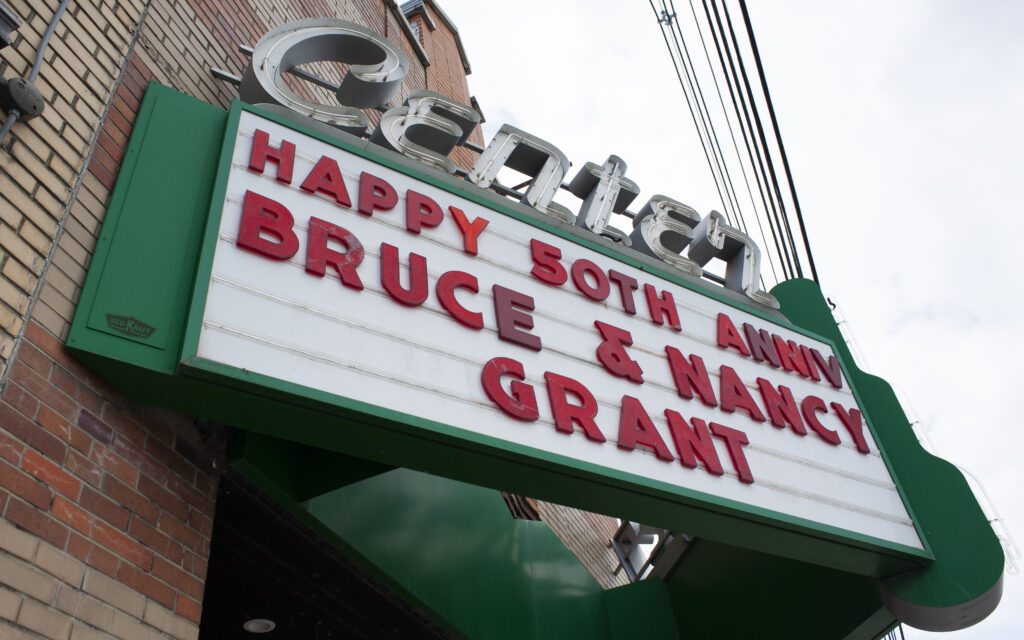
THEATRE MARQUEE —The marquee at the Center Theatre in Dover-Foxcroft is pictured in 2020.
Potential sources for acquiring replacement letters include the art deco Colonial Theater in Belfast, which closed in September of last year, or eBay, Myers said.
The plastic letters are about $20-$30 apiece, which adds up when many come tumbling down, especially in the winter when water freezes in the tracks where the letters sit, Myers said. They crack and break in the summertime as well, but less frequently.
“Winter is the hard time of year because it’s cold and they’re brittle, but it varies quite a bit on the letter,” Myers said. “‘O’ is a pretty stable shape. But ‘K’ and ‘W’ and ‘V’ have long spokes sticking off of them, and when they hit wrong, they just shatter.”
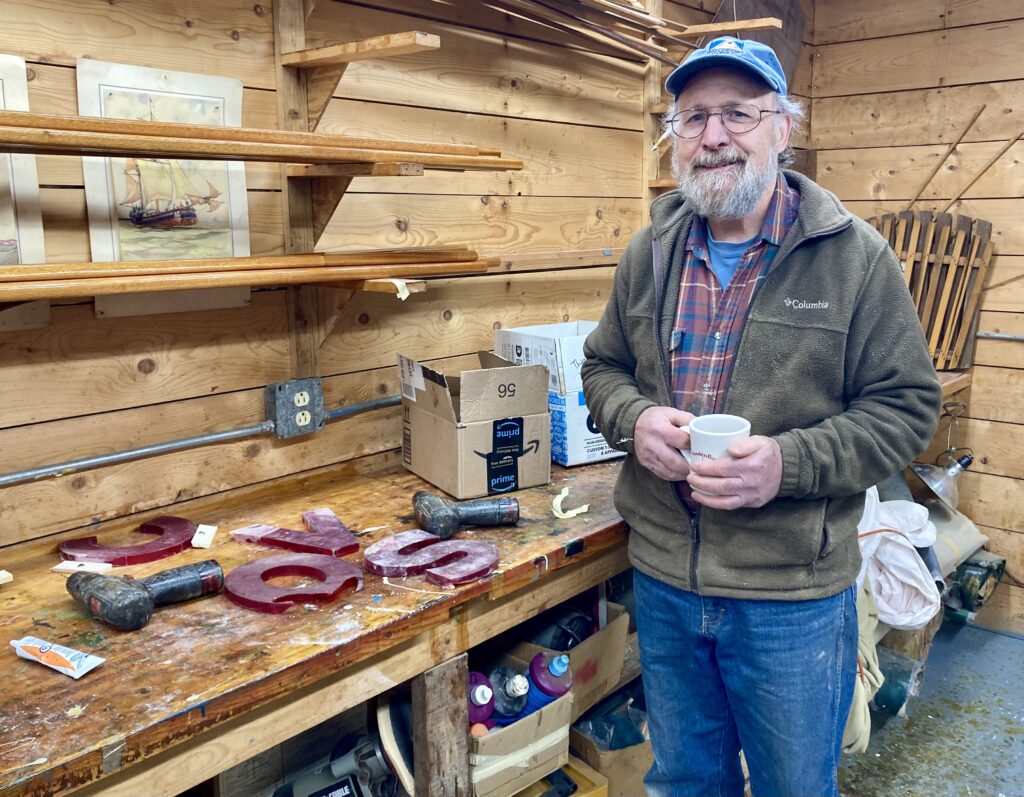
CANOE AND LETTER WORK — Rollin Thurlow, pictured at his Atkinson business Thursday, restores and builds canoes for a living. He also volunteers his time and skills to the Center Theatre in Dover-Foxcroft by repairing damaged letters that have fallen from the marquee.
Sometimes it depends on whether the person changing the letters has mastered placing them on the marquee, which takes some physical strength and practice, Thurlow said.
He opened his business, Northwoods Canoe Co., in the small Piscataquis County settlement of Atkinson in 1982 and has remained committed to a meticulous craft that is becoming more rare.
Myers credits Thurlow, 74, as the driving force behind the theater’s revival that began in 1998. Thurlow led an eight-member board, including his wife Andrea, that stepped up at a time when Dover-Foxcroft appeared to be slowly fading and little was being done to reinvigorate the area, Thurlow said.
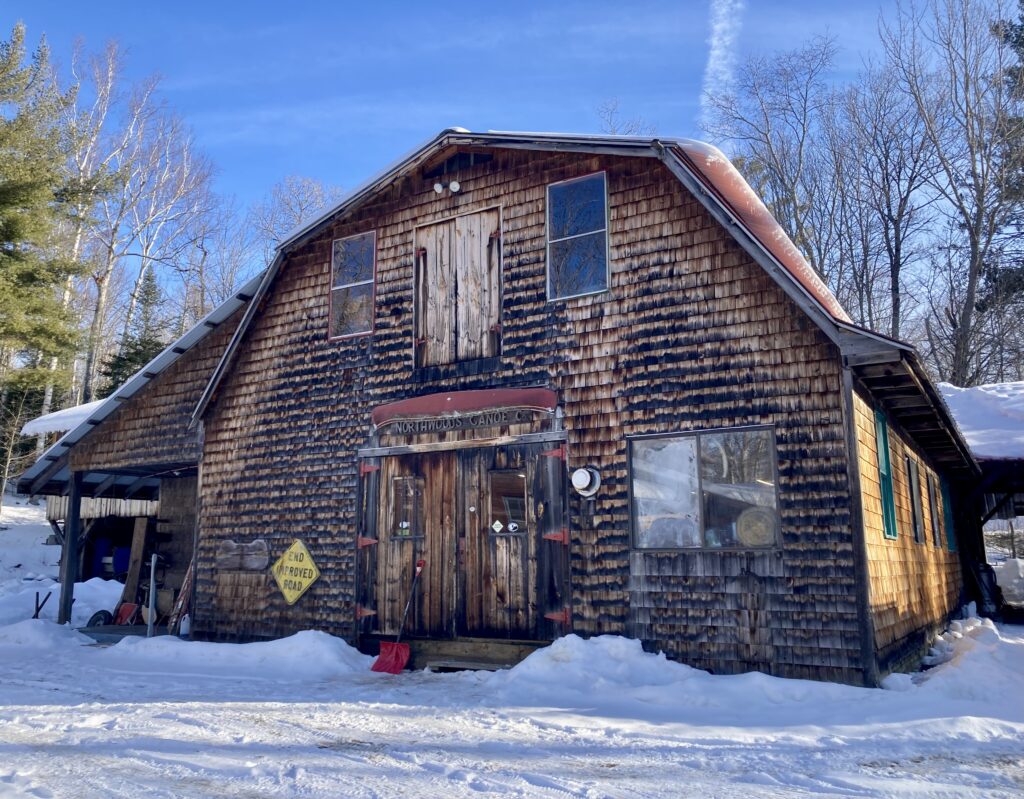
NORTHWOODS CANOE — Rollin Thurlow owns Northwoods Canoe Co., located in the small Piscataquis County settlement of Atkinson.
“At that time, Dover-Foxcroft at 4:30 or 5 o’clock in the afternoon was deserted,” he said. “Nothing happened until Monday when people went back to work. People talked about how downtowns were dying. We were all community-minded and wanted to do something productive. That [theater] checked all the boxes.”
So the group of area citizens got to work. They bought the building in 2002 and spent several years fundraising, maintaining the building and renovating. The Center Theatre held its grand reopening in 2006. It hadn’t functioned as a theater since it shuttered in 1972, though the building was used for various businesses.
Thurlow, who advocates strongly for volunteerism in the community, served as the board’s chairperson for a decade. Now he switches out marquee messages about once a week, while Myers and others handle different days.
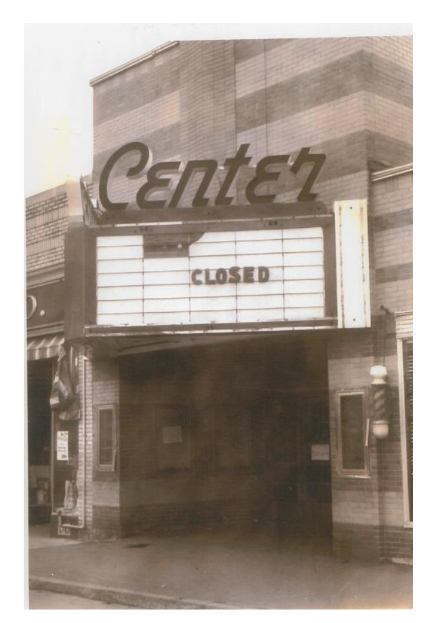
A GLIMPSE OF THE PAST — The closed Center Theatre in downtown Dover-Foxcroft is pictured in the Piscataquis Observer on Oct. 2, 1969. The theater briefly reopened under new management, only to turn the projector off for good in the early 1970s, according to the theater.
And he repairs letters, wounded from plummeting about 12 feet to the ground, just because he loves the place.
Thurlow, who fixes the letters as a volunteer, began the work in 2005, when the new marquee was installed. The board worked with Lewiston-based Neokraft Signs Inc. to build a marquee that replicated the original, relying on old photographs. The investment was well worth it, he said.
“It wasn’t long before we were breaking (the letters),” he said, noting some have had multiple stays at the letter hospital. “Being a boat builder, I had different types of glues and compounds and had to figure out what worked. Eventually some worked pretty good.”
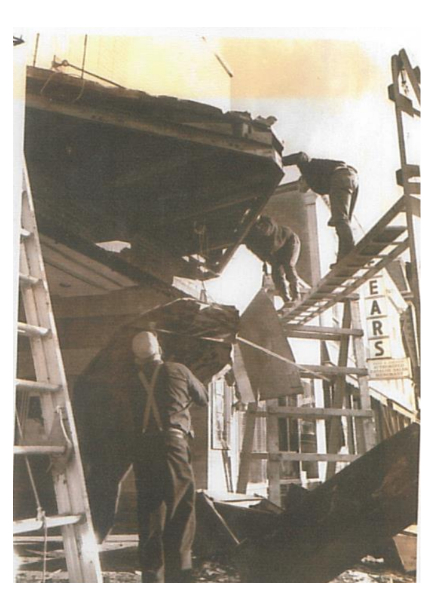
MARQUEE DISMANTLING — Workers dismantle the Center Theatre’s iconic marquee in a Piscataquis Observer photo from Dec. 19, 1974. Not long after the theater’s closure, the building went to the bank in foreclosure and citing safety concerns, it was removed, according to the theater.
Thurlow learned through trial and error that Ambroid glue works best to mend cracks in the letters and to reattach broken pieces, and it dries clear. Modern epoxy comes in handy as reinforcement and an added layer of strength. He also uses thick layers to recreate an angled groove on the backs of certain letters, which is how they sit on the marquee, he said.
Thurlow, standing at his paint-splattered workbench with a mug of coffee nearby, demonstrated the process Thursday. After gluing a letter “C” back together, he drilled small pieces of wood into the table to act as backstops, then left it to dry. Later he would paint it.
“If you put that pressure on it [with the wood], it pushes the letter up and kind of bows it,” he said, talking over the drill. “You do have to be careful not to have anything dripping down the edge, otherwise you’ll glue it to the table. I’ve done that a couple times, and that’s frustrating.”
Thurlow pulled out a cardboard box of “letters beyond hope,” as he calls them. He recycles old parts to patch newly damaged letters.
Like cinema marquees across the country, some of which went viral during the COVID-19 shutdown, the Center Theatre posted positive messages encouraging people to stay safe.
It also found a creative way to generate a small amount of money while its doors were closed to the public. Area residents could pay $25 for their message to appear on a particular date. They could wish their loved one a happy birthday or root for the Foxcroft Academy Ponies in an upcoming game.
People enjoyed it so much that the marquee messages continue to change throughout the week, and the names of films playing at the theater are also featured.
Myers has looked at marquee alternatives for the future, such as large LED signs and 3-D printed letters that he’s experimented with at the local library. But it just isn’t the same, he said, and there’s something about those classic letters and the glowing marquee that illuminates the downtown at night.
Dover-Foxcroft gained a sense of vibrancy when the theater reopened nearly two decades ago, Thurlow said. A transformation that once seemed impossible worked out in the end, he said, and he likes contributing in a small way that sustains the theater all these years later.